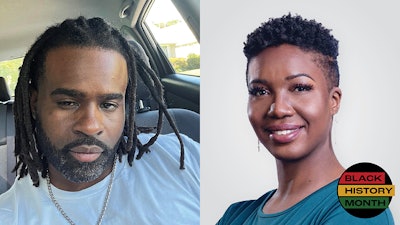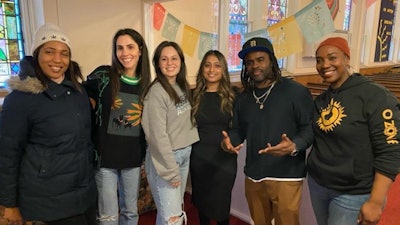
In 1997, Kyle Paige, now a cultivation technician at Ascend Wellness Holdings (AWH) in New Jersey, was incarcerated for cannabis possession.
Paige served 2 1/2 years in prison. Shortly after he was released, he moved to Kansas City, Mo., where he was offered an opportunity to trim cannabis for a medical operator in California who owned three licensed farms.
While in California, Paige says he learned a lot—from how to treat pests to the life cycle of the cannabis plant–his knowledge and education of cannabis grew immensely.
Working his way up, Paige was then asked if he would be interested in "brokering crops," which essentially meant transferring plants from the seller to a buyer, but illegally, he says. After doing this for roughly five years, his world was turned upside down again.
"An informant ended up implicating us in trafficking the cannabis across [state lines], and so we ended up getting arrested–me and my partner in this," he says. "And they offered me 20 years in prison. … I'm like, '20 years in prison for this?' I'm looking at ... Colorado, and people are making millions of dollars on this. And I'm like, 'This is crazy. It doesn't seem right to me.' Luckily, my lawyer got it down to 82 months."
The incident led to Paige embarking on a six-plus-year prison sentence. Years later, he found himself back in the cannabis industry, now operating in the legal market as a cultivation technician for AWH, a multistate, vertically integrated cannabis operator.
The Road to Ascend
Paige's positive outlook and motivation to turn his life around, combined with AWH’s help, has led him to where he is today.
While serving time, Paige met a gentleman involved with the Last Prisoner Project (LPP), a nonprofit organization dedicated to criminal justice reform.
"This gentleman that I met from the Last Prisoner Project, he fought his case from inside of there and got out. And he told me that he was going to reach back in and help get me out, which he did," he says. "He got me out in time to be home for Christmas for my family. It was amazing. My daughter was 12 years old when I got incarcerated; she was 18 when I got released. So, I missed so much of her life."
When Paige was released, he was unsure of his career path. He decided to work in the shipping and receiving field, where he met Chirali Patel, founder and managing partner of Blaze Law Firm, a New Jersey-based cannabis and hemp law firm. Patel also founded Blaze Responsibly, a cannabis business consulting, services, advocacy and education platform.
Paige says Patel helped him reenter the cannabis space and referred him to AWH, where he was automatically hired after applying.
Paige has been working with Ascend for six months, and he says the company has helped him advance in his career by providing him with the necessary resources, education, and opportunities to succeed and, ultimately, taking the time to get to know him and his story.
"Ascend Wellness recognizes everything I went through; they recognize the person I am; they look at who I am, not my background, not my record; they look at who I am. And they are propelling me forward in this industry; I've learned so much,” he says.
"Even though I went through that situation, it is still the best thing that ever happened to me because going to prison made me make the choice that you can either choose negativity or you can continue on a positive path,” he says. “I was already on a positive path with cannabis."
Social Impact Initiatives
Aside from providing returning citizens with job opportunities, AWH engages in various programs and initiatives to support cannabis expungement efforts.
The company has partnered with organizations dedicated to providing opportunities to communities most impacted by the war on drugs to host expungement clinics monthly or quarterly, says Danielle Drummond, AWH's vice president of social equity.
For example, it has partnered with Mass Cultivated in Massachusetts, Black Economic Council of Massachusetts, Urban League of Ohio, Michigan Cannabis Freedom Coalition, and the Westside Justice Center in Illinois, according to a press release.
"[We partner with] organizations already working on expungements or working with returning citizen populations,” Drummond says. “And really, it's twofold. It's one way that we can host these expungement clinics together, but it's also so that we have a pipeline to be able to hire returning citizens who might be interested in the cannabis industry."

Specifically in New Jersey, the company is working with Blaze Responsibly, which Drummond says will help AWH focus on cannabis-related offenses and all expungable offenses in New Jersey.
"It's allowed us to attract folks who wouldn't normally be able to access the services at various expungement clinics that currently exist," she says. "That's been something that we've gotten feedback from participants [who say] they've really appreciated [it].”
In addition, AWH has donated over $65,000 to grassroots organizations through the Ascend Foundation, which was created to expand the company's Corporate Social Responsibility to organizations around the country and support various restorative justice efforts, according to the release.
"We thought that was particularly important because we really want to make sure that we were tapping in with grassroots organizations … who were really tapped into the community and would understand their needs,” Drummond says.
Moreover, AWH has donated over $1.8 million, which includes contributions by Ascend customers, to LPP. The company's contributions to LPP have helped the organization "expand its executive bench, hiring a diverse range of leaders that is representative of the community," according to the release.
More specifically, the company's donations have funded several initiatives, including matching 60 constituents with pro bono attorneys with 41 cases currently being litigated, releasing 21 constituents to date, providing $1 million in micro-grants, and funding constituent commissary accounts, according to the release.
Looking ahead, Drummond says AWH is looking to expand its community partnerships and will continue to host expungement clinics.
"We also have those as resource fairs. So, we're hoping that at each one of them, we have additional partners who we're bringing to each one of the resource fairs," she says. "So we have mental health and case management and food insecurity on a consistent basis. But in each one of the neighborhoods, we're hoping to add additional partners."
The company is also looking to provide social equity applicants with additional resources and recently launched a mentoring program in Illinois.
"We meet [with them] weekly and give them free workshops, helping them to get their businesses up and running," she says. "That's also something that we're looking to expand on and bring into the New Jersey area."
Beyond Cannabis
For cannabis businesses engaging in social equity work, Paige says education and community engagement are key.
"In a lot of minority neighborhoods, most people in those neighborhoods don't really leave that neighborhood unless it's to go to work or go home. So I think we need to be out there on the ground, … in these neighborhoods, putting on these clinics and having people like myself speak at these places," Paige says. "Just being there and being present and working shoulder to shoulder with the people in the neighborhoods, I think that's very important, but also opening the dialog for people to understand what it takes to get the license and what's the difference between a cultivation license and a retail license because a lot of people don't even know that."
Drummond adds it's crucial for cannabis businesses to leverage their power and resources to help open doors for communities most impacted by the war on drugs and make the industry more equitable.
"Anyone who is profiting from the legal business has a responsibility to those folks who were not able to profit from it and whose lives were deeply impacted and to the communities that were impacted," Drummond says. "It's a responsibility that I think we acknowledge as a company and want to make sure that we are fulfilling to the highest degree, and really making sure that we're taking our lead from the community and listening to what it is that they would like us to focus on."
Join us this year at the Paris Las Vegas Hotel & Casino for Cannabis Conference, the leading education and expo event for plant-touching businesses.


























